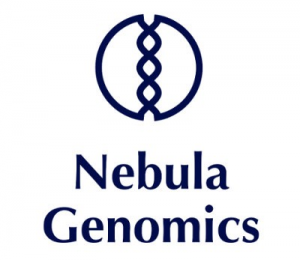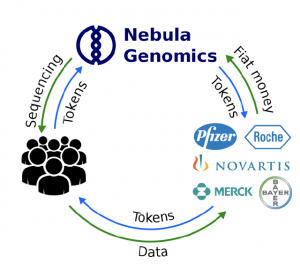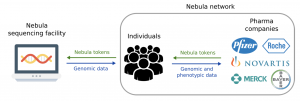Opportunity: the incredible decrease in gene sequencing cost and the promise of blockchain could create a new era of precision medicine.
The dramatic decrease in the cost of sequencing a human genome may well end up the most compelling and consequential technology advance of the past decade. Ten years ago, it cost $10M to sequence a genome. Illumina, the leader in sequencing, promises a $100 genome in the next few years and several promising startups are pursuing credibly higher accuracy and long reads at $100 or less.
Cataloguing and understanding the genome promises a wide range of significant, valuable advancements in human health. With better genetic information, personalized, precise therapies can be developed to treat diseases. It can be used to help people make optimal choices about medical treatments and daily health decisions, such as diet and exercise. Massive genomic datasets can be used to help pharma companies develop better, more effective drugs.
While many of these opportunities are not yet realized, pharma companies are currently paying large sums for genomic datasets to help with drug development. In 2012, Amgen acquired the company deCODE and its 2,600 sequenced genomes for $415M. Genentech paid 23&Me $60M for access to its database. AstraZeneva and Regeneron have both launched multi-million dollar programs to sequence 2M and 500K genomes, respectively.
Solution: use blockchain’s augmented agreements to create a marketplace for genomic data
Nebula Genomics aims to seize this opportunity by creating a marketplace for genomic and phenotypic data. While the cost will fall soon, sequencing currently costs about $1,000 per genome; luckily pharma companies are willing to pay significantly more per genome than that.
A thornier problem is privacy. A person’s genomic sequence is critical, private information. Bank accounts and social security numbers can be changed; genetic makeup cannot. Luckily, the emergence of blockchain protocols allow for a secure, distributed transaction that compensates the person for the data they contribute and gives participants a stake in the network value created by Nebula’s platform.
Nebula’s marketplace:
Pharma companies pay fiat money for tokens, which they pay to Nebula Participants. Nebula Participants pay in tokens to get their genomes sequenced by Nebula, which plans to sequence through partners.
Importantly, Participants store that data themselves, using encryption tools provided by Nebula. This ensures control over data and security as the data isn’t pooled in a central location.
Participants can use Nebula’s genomic self-analysis tool to gain insights about their genome. As more large-scale genomic studies are done, this analysis tool will improve over time, making the platform more valuable to users.
Pharma companies then buy data from users using the Nebula platform. This can be one-time purchase of genomic and phenotypic data or requests for more longitudinal data, such as health records of fitbit data. Participants are paid in tokens, ensuring anonymized transactions. Finally, Participants can sell tokens for fiat money on the market as Pharma companies will regularly pay fiat money for tokens.
Personal Genomics companies are middlemen:
Nebula is a data marketplace, facilitated by sequencing and a blockchain protocol for distributed, anonymized compensation:
Feasibility, risks:
Feasibility relies in large part on acceptance, adoption, and regulation of cryptocurrency. Risks are tied to the booming, but imperfect blockchain and cryptocurrency market. Considering the large amount of money recently invested in cryptocurrency and blockchain companies, it appears that market is here to stay — but, in the event of a serious falling-out of the market or adverse regulatory intervention, Nebula will face challenges. To Nebula’s credit, they aren’t a speculative currency and their business model is greatly enhanced by blockchain protocols.
Competitors
23&Me and Ancestry are two leading personal genomics companies. They only sequence a person’s exome, or the 1.5% of the genome that we know codes proteins. At this stage, we think the rest of the genome plays little role in our biology, but most scientists admit that the rest of the genome is likely more important than we know. Many now believe — and Nebula’s asserts — that sequencing the entire genome is important. Critically, Nebula’s collection of phenotypic data and structure that compensates participants clearly differentiate it from all personal genomics companies.
LunaDNA is another competitor that adopts a similar model to Nebula, but serves as a middleman and lacks Nebula’s quality team.
Sources
Nebula White Paper: https://www.nebulagenomics.io/assets/documents/NEBULA_whitepaper_v4.52.pdf
MIT Tech Review: https://www.technologyreview.com/s/610221/this-new-company-wants-to-sequence-your-genome-and-let-you-share-it-on-a-blockchain/
Fortune: http://fortune.com/2018/02/09/blockchain-genetic-testing-nebula/
Wired: https://www.wired.com/story/solve-genomics-with-blockchain/
Exome vs Genome: https://www.jax.org/news-and-insights/jax-blog/2016/september/genomes-versus-exomes-versus-genotypes





